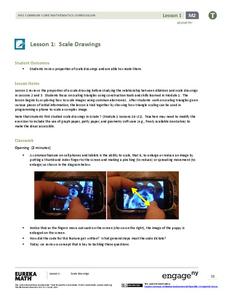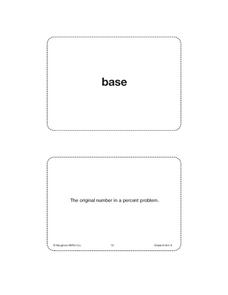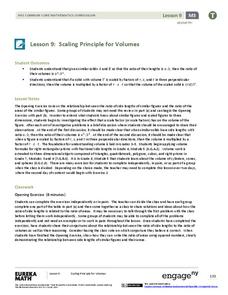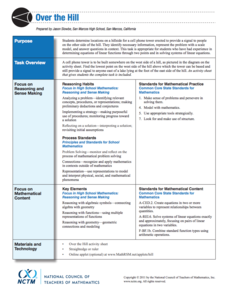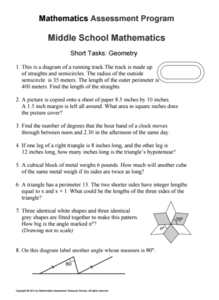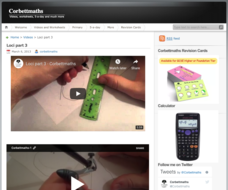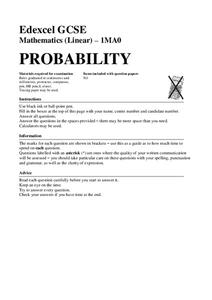EngageNY
Computing Actual Lengths from a Scale Drawing
The original drawing is eight units — how big is the scale drawing? Classmates determine the scale percent between a scale drawing and an object to calculate the length of a portion of the object. They use the percent equation to find...
EngageNY
Solving Area Problems Using Scale Drawings
Calculate the areas of scale drawings until a more efficient method emerges. Pupils find the relationship between the scale factor of a scale drawing and the scale of the areas. They determine the scale of the areas is the square of the...
EngageNY
Scale Drawings
Are you searching for a purpose for geometric constructions? Use an engaging approach to explore dilations. Scholars create dilations using a construction method of their choice. As they build their constructed dilation, they...
Curated OER
Practice: Word Problems
Congratulations, you've just hit the word problem jackpot! Covering an incredible range of topics from integers and fractions, to percents, geometry, and much more, this collection of worksheets will keep young mathematicians...
Noyce Foundation
Which is Bigger?
To take the longest path, go around—or was that go over? Class members measure scale drawings of a cylindrical vase to find the height and diameter. They calculate the actual height and circumference and determine which is larger.
EngageNY
Scale Factors
Is it bigger, or is it smaller—or maybe it's the same size? Individuals learn to describe enlargements and reductions and quantify the result. Lesson five in the series connects the creation of a dilated image to the result. Pupils...
EngageNY
Population Problems
Find the percent of the population that meets the criteria. The 17th segment of a 20-part unit presents problems that involve percents of a population. Pupils use tape diagrams to create equations to find the percents of subgroups...
Houghton Mifflin Harcourt
Unit 6 Math Vocabulary Cards (Grade 6)
Fifty-eight flashcards make up a set designed to reinforce math vocabulary. Within the set, you'll find bold-faced word cards as well as definition cards that offer a labeled example. Terms include base, percent, theoretical...
University of Missouri
Money Math
Young mathematicians put their skills to the test in the real world during this four-lesson consumer math unit. Whether they are learning how compound interest can make them millionaires, calculating the cost of remodeling...
CK-12 Foundation
CK-12 Middle School Math Concepts - Grade 6
Twelve chapters cover a multitude of math concepts found in the Common Core standards for sixth grade. Each title provides a brief explanation of what you will find inside the chapter—concepts from which you can click on and learn more...
EngageNY
Scaling Principle for Volumes
Review the principles of scaling areas and draws a comparison to scaling volumes with a third dimensional measurement. The exercises continue with what happens to the volume if the dimensions are not multiplied by the same...
National Council of Teachers of Mathematics
Over the Hill
Can you hear me from there? Pupils determine the place to build a cell tower on a hill. The class uses constraints and creates a scale drawing on a coordinate system to calculate the exact location of the base of the cell tower.
Balanced Assessment
Ostrich and Seahorse
Examine the relationship between ratios and scale. Young math scholars compare ratios of two models. They use the ratios to make a comparison between the two models. Each image uses a different scale, which requires learners to think...
Balanced Assessment
Shirts and Flags
Learn the importance of geometry to tailors. Given a shirt sewing pattern, scholars determine the actual size of the shirt. After which they answer questions that require problem solving and extending their understanding of scale.
Illustrative Mathematics
Floor Plan
A multi-step problem has learners finding the actual area based on a scale drawing and then converting units at the end. Two different solution choices are listed depending on the preference on which step to start first. Both methods can...
EngageNY
End-of-Module Assessment Task: Grade 7 Mathematics Module 4
Asses the class to determine their knowledge of proportional relationships involving percents. Class members work through the nine-question assessment with a variety of percent problems. The multi-step problems involve simple interest,...
Mathematics Assessment Project
Geometry
Help learners find joy in facing mathematical challenges. The questions posed on this worksheet encourage young mathematicians to utilize skills learned throughout a geometry unit, and to apply themselves and persevere through...
Corbett Maths
Loci Part 3
How do you use a scale drawing to find the region in a lake where a treasure is located? The narrator of a short video problem identifies three criteria to determine the location of the treasure. Using a compass and ruler, he determines...
EngageNY
How Do Dilations Map Lines, Rays, and Circles?
Applying a learned technique to a new type of problem is an important skill in mathematics. The lesson asks scholars to apply their understanding to analyze dilations of different figures. They make conjectures and conclusions to...
Balanced Assessment
Multi-Figures
Apply concepts of scale and ratio to determine relationships in irregular figures. Learners determine the ratio of the perimeters of two figures composed of rectangles and circles. After, they apply similar concepts to find the ratio of...
Noyce Foundation
Boxes
Teach your class to think outside the box. Scholars use the concept of equality to solve a problem in the assessment task. They determine how to use a scale to identify the one box out of a set of nine boxes that is heavier than the others.
Big Learning
The Antarctica Project: A Middle School Mathematics Unit
Antarctica is a big place, large enough to provide ample opportunities to learn about math. A two-week unit teaches middle school mathematics concepts using project-based learning. The resource covers functions, geometry (area,...
Mathed Up!
Probability
How likely is it to draw a blue marble? Pupils find the likelihood of events and connect that to the probability of the event. They find the probabilities of simple events and show their probabilities on a scale.
Balanced Assessment
Don't Fence Me In
Investigate the complexities of design problems using geometric concepts. The task asks scholars to design a fence for a horse based on the distance it can travel within one hour. It is a seemingly simple task — until individuals learn...


